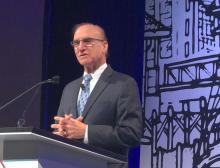BOSTON – A new era for endocrinology could emerge based in part on the recent discovery of viral sequences that align with human peptide hormones, C. Ronald Kahn, MD, said in a plenary presentation at the annual meeting of the American Association of Clinical Endocrinologists.
Using a bioinformatics approach, including four very strongly aligned viral insulin/insulinlike growth factor–I peptides, or VILPs.
When those VILPs were chemically synthesized, the resulting peptides were able to bind to insulin and IGF-I receptors and stimulate postreceptor signaling, Dr. Kahn and colleagues reported in March 2018 in PNAS.They also observed increased glucose uptake and activation of cell proliferation associated with VILPs, along with significantly lowered blood glucose when they were injected into mice.
Together, those results help define VILPs as the first viral hormones to be characterized, according to Dr. Kahn, head of the section on integrative physiology and metabolism at Joslin Diabetes Center, Harvard Medical School, Boston.
“We think that this is the tip of an iceberg, and could be the beginning of a new generation for endocrinologists – that of viral-hormone endocrinology,” Dr. Kahn said in his plenary presentation.
The positive outcomes seen in rodent and human cells suggest a potential role for using VILPs to treat human disease, according to Dr. Kahn.


